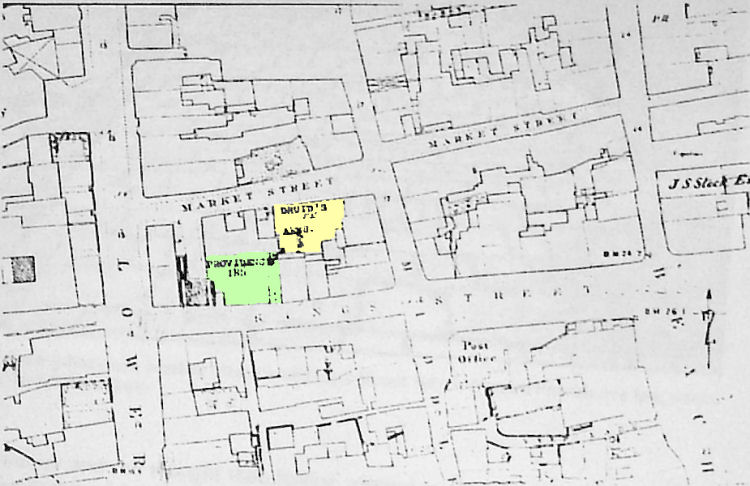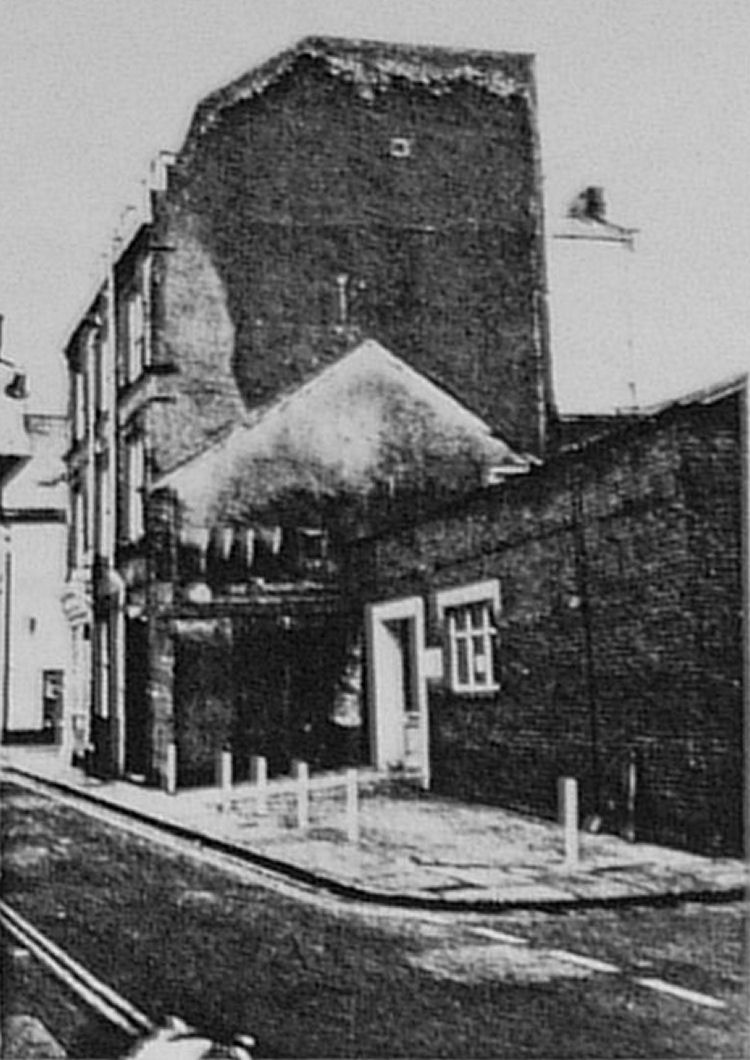|
From an issue of Bygone Kent Vol 15 No 4. October 1994.
DEATH AT THE DRUIDS
By Julie Deller
A good public house provides far more than liquor. It is a port of
call for locals, friends and street acquaintances meet there, presided
over by a landlord who acts out his role as Mine Host and there may even
be a pretty barmaid to make the older gentlemen think - for a while at
least - that they are young again! A pub needs to be a comfortable and
happy place. This is the story of one which was neither.
In October 1901
"The Druid's Arms," a Thompson's house in Deal's old Market Street, became
the scene of a most miserable death. It may not have been reported as a
tragedy, but for those who knew the landlord it was a tragic ending for
his life.
Mr and Mrs Browning had lived and worked at the "Druid's Arms"
for thirty two years. It was, of course, far too close to the "Providence
Inn," it most popular public house where whisky was served from six in
the morning until eleven at night. Tripe and onions was a dish always on
the Bill of Fayre and the pub also sold milk. Doubtless the Deal boatmen
gathered there during those long opening hours and there Is little doubt
that "The Providence Inn," also a Thompson house, did a better trade than
the "Druid's Arms."

William Browning worked on the beach helping to launch
the boats for fishing in winter and trips to the Downs for summer
visitors. During August of 1899 he broke his leg. Unable to carry on his
boat work he began to worry as money became short.
In turn Mrs Browning
worried about her husband. She suggested he went to the doctor to gel a
tonic to 'brace him up', but he refused, although, as his wife said, he
knew that he was just not as he used to be - not himself. He was always
tired and left his wife to serve the few customers who came into the
bar. They began to discuss leaving the pub for a less tiring kind of
business. A nice little tobacconist's shop, where they could sell
mineral waters, seemed a good idea, yet Mr Browning, feeling depressed,
could not make the decision. Finally, after two years of poor health, he
agreed to give notice to the Brewery.
The morning before they were due
to leave the "Druid's Arms," Mr Browning told his wife that he had stomach
pains and diarrhoea, for weeks he had eaten very little and slept less.
On that gloomy October afternoon Mrs Browning made a pot of tea and gave
a cup to her husband who sat by the fire without speaking. Someone was
heard coming into the bar, so Mrs Browning left her husband sitting by
the light of the fire, to greet Mr Wraight who was a friend and anxious
about Mr Browning's health. When Mrs Browning told him how poorly he was
Mr Wraight said he would like to buy him a drink and Mr Browning then
came from the kitchen and into the bar. He spoke to Mr Wraight and
accepted his offer saying that he would have a glass or beer with some
ginger beer, but his wife said that it was not good for his stomach
upset, so Mr Wraight said 'Have a little drop or brandy - hot'. Mr
Browning shook hands with Mr Wraight and returned to the kitchen where
he once again took up his seat beside the fire. The room was dark, as
Mrs Browning had not lit the gaslight. She gave her husband the brandy,
which she had warmed, and suggested that he should go up to bed if he
felt no better. Her husband said: 'I don't want to go to bed. You come
back as soon as you've served; don't stop.'
Mrs Browning returned to the bar, lit the gas there and washed up a few
glasses from around the room, chatting to a woman friend and Mr Wraight.
After about ten minutes she excused herself saying that her husband was
sitting in the dark and she must light the gas bracket in the kitchen.
Soon after she was to return to the bar shrieking 'Fetch Mr Wraight.
Something's wrong'.
Something was very wrong indeed. Mr Browning had
hanged himself. Mr Wraight dashed out after the distracted woman and saw
the body of Mr Browning suspended from a beam in the outside closet. He
quickly cut him down and did his best to revive him but, after a few
breaths, he was soon quite dead.
An Inquest was opened on the following morning with a jury which
included, amongst the twelve good men and true, some well known Deal
names. The Foreman was Mr F. Roberts and there were two near neighbours:
Mr W. Hunnisett the Linen Draper in the High Street and Mr E. Inkpen the
Coal Merchant of 3 Market Street. The Brewers were represented by Messrs
A. Morton and B. Turner.
Mary Jane Browning stated that she lived at the
"Druid's Arms." She then identified the body, just viewed by the Jury, as
that of her husband William Browning, licensed Victualler, and went on
to tell the melancholy story of the previous afternoon. He had, she
said, lived at the Druid's Arms since 1869. His only trouble was that
they were leaving the house because they were unable to pay their way
since her husband had broken his leg and could not take on beach work.
'He was not given to worrying about things until the last two years,' she
said, but she knew that he did not really want to give up the business.
She thought that he was so worried about leaving that it had preyed on
his mind.
Mrs Browning explained how she had left her husband sitting by
the kitchen fire, but when she returned he was not there. She took a
lighted candle and went upstairs to look for him, thinking that he had
decided, after all, to go to bed, although he had not told her as he
usually did. She looked in at the private closet, but he was not there,
so she opened the back door and called to him. There was
no answer and she thought that, having seemed so drowsy, he might have
fallen asleep in the public closet in the yard. She then opened the door
of the yard closet and saw her husband's body hanging from a beam. She
added that she remembered calling for Mr Wraight, but had no clear
memory of anything else at that time.
Mr Wraight went at once and cut down the body, saying that he thought
there was still some life in it. In his evidence Mr Wraight said that,
when he cut down the body there was still life in it and he carried it
into the kitchen asking Mrs Browning to send for a doctor, but one could
not be found for some time and when the doctor did arrive Mr Browning
was dead.
'I quite thought that I was going to restore him,' said Mr Wraight. 'The
string I cut from the body was no thicker than a penholder and he
breathed for about half a minute afterwards.' Mr Wraight stated that the
deceased's feet were about four inches clear of the ground. After cutting him down the witness said that he blew into his mouth to get the
lungs to work and kept rubbing at him, so as to get the breath in. He
had always found this the best thing to do, but no one came to assist
him. The Coroner said 'You acted very promptly, but I doubt if that is
the most approved method which is to let them lie on their back and work
the arms gradually up and down'. (These days Mr Wraight's method would
have been praised.) Mr Wraight rejoined with 'I always thought that
Christians were the same as dumb
animals and that is the best way to restore them. I could not get a
doctor so I doctored him as well as I could myself, but I saw no sign of
life after, except a gasp
or two'.
Representing Thompson's the Brewer, Mr Turner said that he would
like to state that the Browings were leaving the house at their own
request. The hope for a
tobacconist's shop was then mentioned: he had told them that, if they
wished to leave they could do so, but it was not necessary to
serve them with notice. Several months later the Brownings informed him
that they had found a place and would remove the best part of the
furniture and leave the other for valuation. Thompson's had found
another tenant and the change was to have taken place that day. The
deceased owed no money and Mr Turner made it very clear that the
Brownings had never had pressure placed upon them to leave. It was of
their own accord and at their own request. Dr Hardman (Coroner) asked if the Browmings were 'getting past the proper management of the house',
to which Mr Turner replied 'They could manage the house all right, but
people seldom come in to see old people'. 'Was business falling of?'
asked Dr Hardman. 'It was about the same as the last few years, but they
paid the firm very regularly,' said Mr Turner.
In summing up the Coroner placed some emphasis on how 'satisfactory' it
had been to have the representative of Messrs Thompson's present and to
know that - as it was supposed - there had been no harsh action from the
firm to the tenants. They were leaving of their own accord. He added
that it was probably reasonable to suppose that the breaking or old
associations might, to some extent, have weighed upon the mind or Mr
Browning, also parting from a home where he had lived for over thirty
years could have had a depressing effect. He said that, if the Jury
coupled these thoughts with the evidence given by the widow he felt that
they would have no difficulty in coming to the conclusion as to the
state or deceased's mind at the time he took his life. A verdict was
returned 'at once' on suicide during temporary insanity.
The local newspaper carried the notice or Mr Browning's death with
nothing more than: 'BROWNING October 15th, at the Druid's Arms, Market
Street, Deal, William Browning, aged 67 years'.
Some time later the Druid's Arms became the Druid's Supper Rooms, under
the management of a Mr Catt who later founded Catt's Restaurant which
was so popular in Deal until the 1970s.
Editor's Note
The licensing Act of 1872 restricted pub opening hours in England. In
towns, pubs could now only stay open from 6 a.m. to 11 p.m. It was an
unpopular measure. A further licensing Act in 1902, aimed at reducing
Britain's pubs by one third, did away with many undesirable (or only
marginally profitable) houses. Perhaps the "Druid's Arms" was in this
category and it may have been the cause of the landlord's worries.
|

